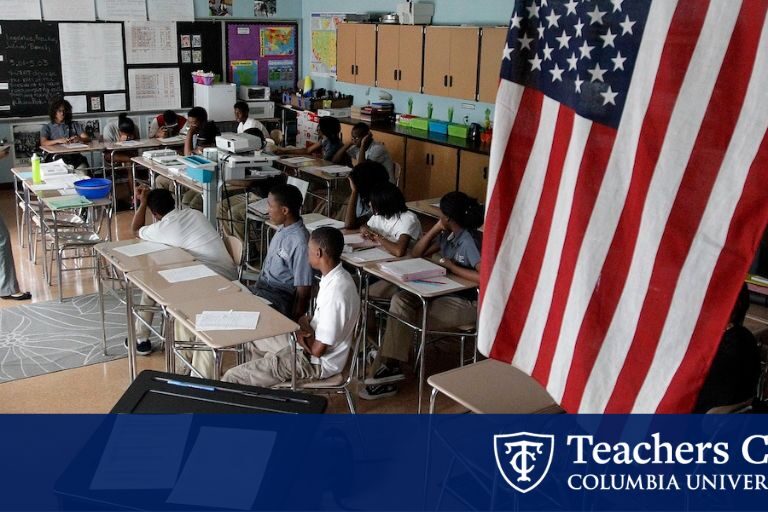By Thomas Bailey, President of Teachers College
As the 2024 presidential race enters the final few weeks, amid all the talk of protecting America’s future, we are still missing a critical issue that affects the very foundation of our nation: the crisis in K-12 education. While classrooms struggle under the weight of teacher shortages, political battles over curriculum, and stagnant wages, we have heard few solutions to one of the most urgent challenges facing our society. The future of America’s workforce, democracy, and global standing depends on what happens in our schools—and it’s time for our leaders to act.
The nation’s schools are facing a critical challenge. Research from Brown University and the University of Albany shows that interest in the teaching profession has dropped nearly 40% since 2010. This shortage makes it harder to staff classrooms and provide students with the education they need. As of last fall, K-12 teachers in the U.S. earned an average $68,000 annually. That’s 8% less than the average wage for all workers in the country, according to the ADP analysis, and a major factor in this exodus. Combined with poor working conditions, low pay has led to burnout and a mass exit from the field.
On top of that, teachers are caught in political crossfire. Polarizing debates over what should be taught — whether it’s history, race, or gender —are undermining their autonomy. These battles have turned classrooms into battlegrounds, preventing teachers from providing students with a comprehensive education free of political interference.
Thomas Bailey, President of Teachers College. (Photo: TC Archives)
A well-educated populace is essential for equity and civic engagement. Schools should do more than prepare students for jobs. They must empower the next generation with critical thinking and problem-solving skills to tackle tomorrow’s challenges and engage in productive discourse across diverse perspectives to develop solutions. Without a strong commitment to this mission, entire generations could be sidelined from meaningful participation in society. We are at risk of entrenched polarization.
Civics education, in particular, is indispensable for preparing students to participate meaningfully in a democracy. Civic literacy helps students understand how government works, their role as citizens, and the importance of voting, community engagement, and public service. Yet, civics education is increasingly marginalized in many districts.
Our next presidential administration must prioritize policies that reinforce civic education, ensuring students are not only equipped for the workforce but also for the responsibilities of democracy itself. A strong, inclusive education system is indispensable for our nation’s prosperity and stability. The path to our country as a thriving, equitable and civically engaged populace runs straight through our classrooms.
We need to hear the bold plans that prioritize teachers and students. First, teachers deserve better pay and professional respect. Competitive salaries are crucial to attracting and retaining talent. Improving working conditions and offering fair compensation can help reinforce the societal value of education and its role in shaping the future. Where is the outline for how we will make teaching a more valued career?
(Photo: iStock)
Equally important is restoring educators’ autonomy. In an era where classrooms have become battlegrounds for political debates over curriculum, especially on topics like history, race and gender, teachers are restricted from providing honest, comprehensive instruction. These restrictions stifle meaningful discussions that help students understand the world. To foster true learning, teachers need the freedom to engage students without fear of politically motivated censorship. Our next President must propose policies that ensure classrooms remain spaces for truth and critical thinking.
Lastly, we need continued innovation in teacher preparation programs. Residency models, like those featured at Teachers College and the new Empire State Residency, place aspiring teachers in New York City schools, providing critical support through stipends while students complete their clinical practice. Through mentoring and real-world experience, these types of programs equip teachers with the skills needed to address students’ mental health, technological, and academic challenges. Such models, rooted in partnering communities, should be expanded nationally. With federal support, these residency-based programs could help address teacher shortages in underserved communities across the country, ensuring new teachers are fully prepared to tackle modern classroom challenges.
Our presidential candidates should promote policies that support this approach, using partnerships between universities and local schools to strengthen the teacher pipeline and ensure long-term success for students and educators.
As we approach Election Day, it’s important to recognize that while education may not be at the forefront of the national debate, it remains a crucial issue in communities and states across the country. Local elections, school board votes, and ballot initiatives are shaping the future of our education system in real time. The future of our democracy, workforce, and global standing rests in the hands of today’s teachers and students. If we fail to invest in a robust, equitable, and forward-thinking education system, we risk not only falling behind but also undermining the values that make America strong. In this election, we need a bold, transformative vision for education that empowers teachers, protects their autonomy, and equips students for the challenges of tomorrow. Anything less is a failure to lead.
Thomas Bailey is the 11th president of Teachers College, Columbia University — the nation’s first and largest graduate school of education, health, and psychology.
The views expressed in this article are solely those of the speaker to whom they are attributed. They do not necessarily reflect the views of the faculty, administration, staff or Trustees either of Teachers College or of Columbia University.
Published Monday, Oct 21, 2024

